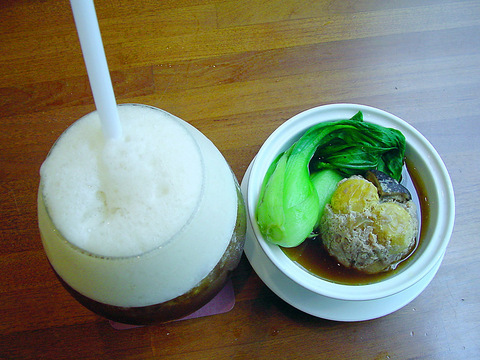It is believed that Taiwan's tea-drinking culture started in Taichung and Chun-shui Tang is a popular place for people to hang out and drink tea, or take a simple meal or snack at the same time.
The tea house has come up with quite a few cool inventions in the past such as foam black tea and pearl cream tea, that were first introduced to the Taiwan public, in 1983 and 1987 respectively. The pearl cream tea mixed by Chun-shui Tang is still considered unbeatable, however, and Chun-shui Tang is now operating as a chain store, having spread to the major cities and based itself in Taichung.
The tea house located by International Street near the Tunghai University campus is unique because it is in a street lined with artefact shops, boutique stores and gourmet restaurants. It is a one-way street and is usually packed with people during the weekends, and in the evenings on most weekdays when the university faculty and students come to patronize their favorite restaurants.

PHOTO: DEREK LEE, TAIPEI TIMES
Most of the tables in the tea house are arranged to lean against a large beautifully-shaped glass window through which sunlight filters through fine bamboo curtains. Little potted plants and elegant flower arrangements at every turn are pleasing to the eyes and create a good mood. The second-floor interior and teak-wood furniture of the place gives visiting guests the idea of a traditional Taiwanese tea house, yet with a modern and clever twist.
Best of all the food served with the teas is generally good, with a refined taste. The square-shaped brown sugar teacake introduced last year proved to be a knock-out for its smooth taste. It is a bit sweet at first bite. Yet, with a sip of the tea, the taste in your mouth turns and make the tea flavor much more fragrant.
If you care for a simple repast, the set meal of ground-pork with pickle is probably the best bet. The dish is served in a chinaware bowl with steamed meatballs mixed with thick sliced black mushrooms and egg yolk. Green vegetables are served on the side. The soup goes well with the white rice. The side dish of daikon pickles is neither hot nor salty.
Furthermore, your side order of tea -- either oolong, jasmine or another kind, with ice or hot -- always comes with extra-large cups or a teapot and will add to the satisfaction of the meal. -- Derek Lee

US President Donald Trump may have hoped for an impromptu talk with his old friend Kim Jong-un during a recent trip to Asia, but analysts say the increasingly emboldened North Korean despot had few good reasons to join the photo-op. Trump sent repeated overtures to Kim during his barnstorming tour of Asia, saying he was “100 percent” open to a meeting and even bucking decades of US policy by conceding that North Korea was “sort of a nuclear power.” But Pyongyang kept mum on the invitation, instead firing off missiles and sending its foreign minister to Russia and Belarus, with whom it

When Taiwan was battered by storms this summer, the only crumb of comfort I could take was knowing that some advice I’d drafted several weeks earlier had been correct. Regarding the Southern Cross-Island Highway (南橫公路), a spectacular high-elevation route connecting Taiwan’s southwest with the country’s southeast, I’d written: “The precarious existence of this road cannot be overstated; those hoping to drive or ride all the way across should have a backup plan.” As this article was going to press, the middle section of the highway, between Meishankou (梅山口) in Kaohsiung and Siangyang (向陽) in Taitung County, was still closed to outsiders

President William Lai (賴清德) has championed Taiwan as an “AI Island” — an artificial intelligence (AI) hub powering the global tech economy. But without major shifts in talent, funding and strategic direction, this vision risks becoming a static fortress: indispensable, yet immobile and vulnerable. It’s time to reframe Taiwan’s ambition. Time to move from a resource-rich AI island to an AI Armada. Why change metaphors? Because choosing the right metaphor shapes both understanding and strategy. The “AI Island” frames our national ambition as a static fortress that, while valuable, is still vulnerable and reactive. Shifting our metaphor to an “AI Armada”

The Chinese Communist Party (CCP) has a dystopian, radical and dangerous conception of itself. Few are aware of this very fundamental difference between how they view power and how the rest of the world does. Even those of us who have lived in China sometimes fall back into the trap of viewing it through the lens of the power relationships common throughout the rest of the world, instead of understanding the CCP as it conceives of itself. Broadly speaking, the concepts of the people, race, culture, civilization, nation, government and religion are separate, though often overlapping and intertwined. A government